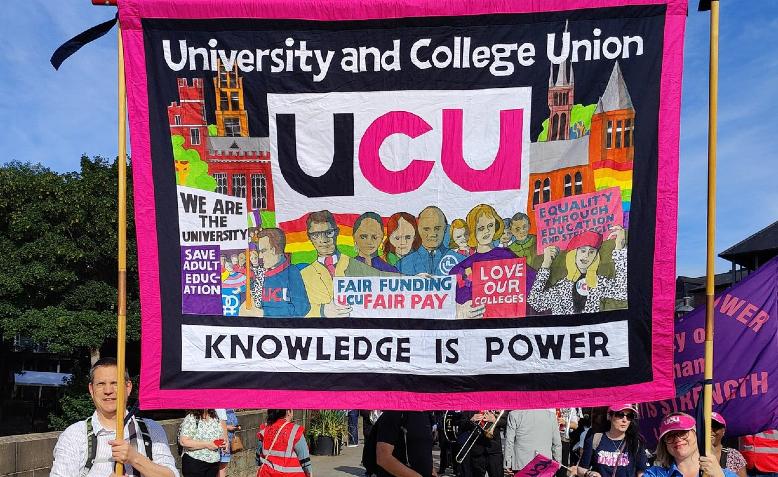 UCU banner, Durham Miners Gala 2022. Photo: @ucu / Twitter
UCU banner, Durham Miners Gala 2022. Photo: @ucu / Twitter
The union movement as a whole needs to rally against vicious employers, argue Counterfire UCU members
A number of university managements are now facing a backlash from UCU members against threats of punitive deductions. The national Marking and Assessment Boycott (MAB) began on 20 April at 145 universities across the UK in a dispute about pay and conditions, and hardline management approaches threatening between 50 and 100% pay deductions for those participating has been met with defeats barely a week in.
A tweet from the University of Hertfordshire UCU on 26 April reported that management had withdrawn its initial threat of 100% deductions after meeting the union. While not abandoning the principle of making deductions for participation in the MAB, the university management accepted a different approach.
According to the union, ‘the University management will now meet to devise a School by School formula to make wage deductions from those taking part in the boycott that reflects the amount of contractual time they would have spent marking during the boycott.’
At Queen Mary, University of London, the union threatened a local strike and got agreement from management for no deductions for participating in the MAB, and agreement not to deduct retrospectively should management decide to change course. This is an extraordinary achievement, given that last year management docked 100% pay from staff for not rescheduling teaching as a result of industrial action.
The management at Leeds University was also threatening 100% deductions. In response, members voted by 90% in favour of strike action. We have yet to see how management will respond. At SOAS, another university threatening 100% deductions, almost 600 staff and students signed an open letter in opposition and also voted for strike action.
These are all victories for union branches. It shows that the threat of 100% deductions was always a tactic fraught with risk. For one thing, it would be difficult to demonstrate in court how the figure equated with work not performed. Some universities have argued that the deductions are fair because they do not accept ‘partial performance’ but this is at best a grey area in the law and the national union needs additional legal advice about the implications for managements over what is an effective lockout. The question is whether managements are willing to suspend staff for legal industrial action.
Moreover, implementation of high deductions was always going to lead to major anger and resentment, including significant strike action and further disruption during the exam period. Members are rightly asking why they should work at all if they are being deducted all of their pay. Motions were passed earlier this month at UCU’s Special Higher Education Sector Conference (SHESC) around the need for a national strike to back up the MAB but we have yet to hear from the national union regarding more action.
These are not only important victories for the UCU branches in question but also victories with wider implications. It shows that employers are not confident of their legal standing when making such high deductions. It also suggests that they are nervous about escalating industrial disruption. Some university managements have not even decided whether or how much to deduct, and are waiting to see what happens at individual institutions. Branches across the UK should take note.
What has been gained at Queen Mary and Hertfordshire should also be taken up by the union nationally – through another round of national strike action, legal threats and so on. That would offer concrete support to branches across the country facing punitive deductions, and would put more pressure on the Universities and Colleges Employers Association (UCEA) to come back to the negotiating table.
The threats against UCU members represent the thin end of the wedge and, if they are allowed to pass, will embolden aggressive employers to press their anti-union agenda as an increasingly right-wing Tory party moves to implement ever more anti-union measures.
But union members in all sectors should take heart. The employers are clearly not as confident as they seem. The strike wave is becoming a wider fight against anti-union laws and for the common good. With inflation increasing rather than decreasing, more and more sections of the working class will sympathise with those fighting back and defying anti-democratic, anti-union measures.
And we are also part of a discussion in which the public sector and the public good are seen by more and more people as under threat by the right-wing, profit-driven Tory agenda of cuts and privatisation.
The argument that the university sector has to reverse its multi-year, scandalous approach of offering sub-inflation pay rises as work becomes more intense, and inequalities and casualisation remain rife, will echo increasingly strident calls for defending the NHS, education, social services and many other threatened sectors of the welfare state.
Join the 10 June How We Fight, How We Win Rank-and-File Organising Conference

Join Revolution! May Day weekender in London
The world is changing fast. From tariffs and trade wars to the continuing genocide in Gaza to Starmer’s austerity 2.0.
Revolution! on Saturday 3 – Sunday 4 May brings together leading activists and authors to discuss the key questions of the moment and chart a strategy for the left.

